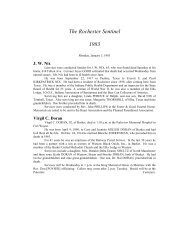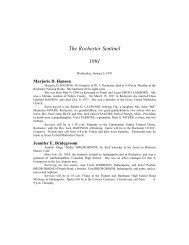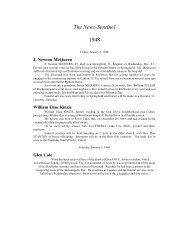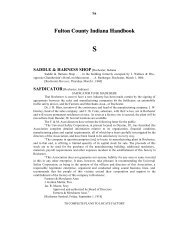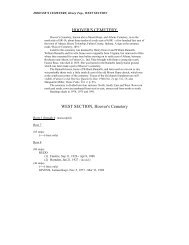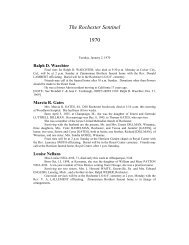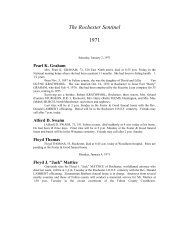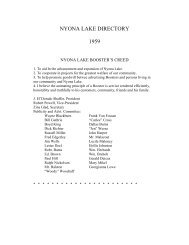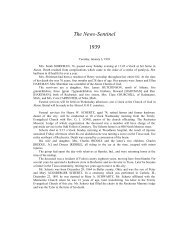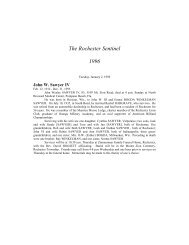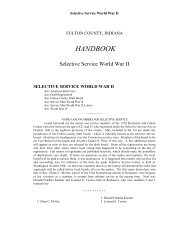Handbook N-P - Fulton County Public Library
Handbook N-P - Fulton County Public Library
Handbook N-P - Fulton County Public Library
You also want an ePaper? Increase the reach of your titles
YUMPU automatically turns print PDFs into web optimized ePapers that Google loves.
Pa<br />
In the extreme northwest corner of Citizens Cemetery, along West Ninth Street, there is a<br />
small gray granite gravestone that proclaims: “John Patton, Died May 15, 1905, Patriot of Civil<br />
War 1861-1865, Colored.”<br />
Behind this curious inscription is the unusual story of a Negro slave who escaped from<br />
his masters in the South, joind a Union Army regiment containing Rochester soldiers and ended<br />
his days as “Uncle Johnny Patton,” a respected citizen of this community.<br />
It is a tale that became a part of my 1997 book concerning the Civil War experiences of<br />
that regiment, the 87th Indiana, entitled “A Stupendous Effort.” Not long ago a woman came to<br />
our office to inquire about the meaning of the headstone’s lettering, thereby forcing me to accept<br />
the astonishing fact that not everyone has read that excellent book. Such dereliction will not,<br />
however, stand in the way of a repetion of this interesting bit of local history.<br />
The 87th Indiana, which had 300 <strong>Fulton</strong> <strong>County</strong> men among its 10 companies, was<br />
encamped in Tennessee at Triune, south of Nashville, in the spring of 1863 when John Patton<br />
wandered into its midst. He had become aware of President Lincoln’s Emancipation Proclamation<br />
that freed all slaves in territories then in rebellion against the federal government. So he escaped<br />
from his slaveowning master and sought refuge with the nearest Union Army. Thousands like him<br />
were doing the same thing at the time.<br />
As it happened Patton encoutered soldiers of the 87th’s Company F, whose commander,<br />
Captain Horace Long of Rochester, allowed him to stay as a personal cook and body servant. He<br />
remained with Long the company and regiment for the rest of the war, through the battle of<br />
Chickamauga, the overland campaign leading to the capture of Atlanta, the resulting March to the<br />
Sea and finally, the Carolinas campaign to war’s end.<br />
When that came in April of 1865, Patton was invited by Long and other soldiers from<br />
Rochester to return here and live out his life.<br />
That he did and for the next 40 years he was a familiar figure on the local scene. He<br />
lived in a small frame house in the southeastern part of the town and performed all manner of<br />
useful work for his fellow citizens. They treated him generaly as one of their own and described<br />
him as “willing, honest and genteel.” Late in his life they bought him a peanut and popcorn stand<br />
which he operated for many years along Main Street.<br />
Patton’s age at his death was listed only as “over 80” and not much is known of his<br />
background before he appeared at Triume. He once said that he married as a young slave and that<br />
his wife and three children were sold away from him. He was sold himself to three diferent<br />
master, he claimed, once for the handsome sum of $1,400.<br />
The true measure of John Patton’s life as a free man in Rochester, Indiana, was the<br />
respect shown to his memory upon his passing in the spring of 1905.<br />
His soldier friends quickly determined that “Uncle Johnny” would not be consigned to a<br />
pauper’s grave. They agreed to share the expenses of a funeral and appointed two of their number<br />
to make the arrangements.<br />
The funeral itself took the form of a campfire ceremony of the Grand Army of the<br />
Republic, the organization of Civil War veterans. Thus was Patton granted the ultimate<br />
compliment his soldier friends could give: recognition as a comrade.<br />
The services held at the <strong>Fulton</strong> <strong>County</strong> Home were attended by 30 Civil War veterans. A<br />
local minister gave the sermon and seven of Patton’s soldier friends each made brief remarks<br />
concerning his life.<br />
The Evening Sentinel, finally and fittingly, published a substantial obituary of this former<br />
slave in which it was written that the funeral “was a tribute of respect to his faithfulness and<br />
integrity as a man” and went on to state that Patton “possessed the noblest qualities of the colored<br />
race and his memory will abide in Rochester for many a day.”<br />
And so it has.<br />
[Rochester Sentinel, Tuesday, October 3, 2000]<br />
PAULK, KENNETH [Rochester, Indiana]




